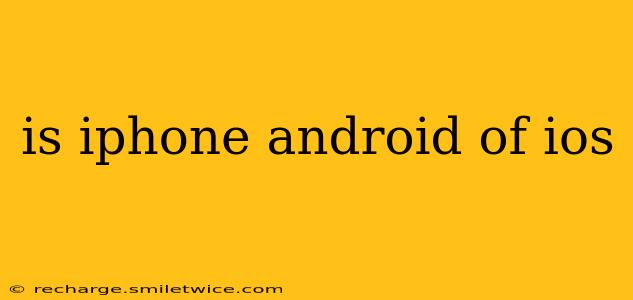The question "Is iPhone Android or iOS?" is a common one, especially for those new to the world of smartphones. The simple answer is: iPhone uses iOS, not Android. These are two completely different mobile operating systems developed by competing companies. Let's delve deeper into the differences and explore some related questions.
What is iOS?
iOS is the mobile operating system developed by Apple Inc. exclusively for its iPhones, iPads, and iPod Touches. It's known for its user-friendly interface, intuitive design, and strong focus on security and privacy. iOS devices are characterized by their sleek design, high-quality build, and seamless integration within the Apple ecosystem. This ecosystem includes services like iCloud, Apple Music, and the App Store, creating a tightly integrated user experience.
What is Android?
Android, on the other hand, is an open-source mobile operating system developed by Google. Unlike iOS, which is exclusive to Apple devices, Android is used by a wide range of manufacturers, including Samsung, Google (Pixel phones), OnePlus, and many others. This leads to a much broader variety of devices available at different price points. Android is known for its customization options and open nature, allowing users to personalize their devices extensively.
What are the Key Differences Between iOS and Android?
The differences between iOS and Android go beyond just the devices they power. Here's a summary of some key distinctions:
- Operating System: iOS is a closed-source operating system, meaning its code isn't publicly available. Android is open-source, allowing developers to modify and adapt the system.
- Customization: iOS offers limited customization options, focusing on a streamlined user experience. Android allows for extensive customization, with options to change launchers, widgets, and even the entire look and feel of the operating system.
- App Stores: Both platforms have their own app stores (App Store for iOS and Google Play Store for Android). While many apps are available on both platforms, there are some exclusive titles.
- Cost: Generally, iPhones tend to be positioned at the higher end of the price spectrum, while Android devices offer a wider range of prices, including many budget-friendly options.
- Ecosystem: iOS is tightly integrated with other Apple services and devices, creating a seamless ecosystem. Android also boasts a robust ecosystem, but it’s less tightly integrated, allowing for more flexibility and choice.
Is iOS better than Android?
There's no single "better" operating system. The best choice depends entirely on individual preferences and needs. iOS users often appreciate its simplicity, ease of use, and strong security. Android users value the customization, versatility, and wide range of device choices.
What are some popular iOS apps?
Popular iOS apps span a variety of categories and include stalwarts like:
- Messages: Apple's built-in messaging app, supporting iMessage for seamless communication between Apple devices.
- FaceTime: Apple's video calling service.
- Safari: Apple's web browser.
- Mail: Apple's email client.
What are the pros and cons of using iOS?
Pros:
- User-friendly interface: Simple and intuitive for users of all skill levels.
- Strong security and privacy: Apple has a strong track record in protecting user data.
- Seamless ecosystem: Integration between Apple devices and services is smooth.
- High-quality apps: The App Store generally features high-quality, well-vetted apps.
Cons:
- Limited customization: Fewer options for personalizing the device.
- Higher price point: iPhones typically cost more than comparable Android devices.
- Less device choice: The only manufacturer of iOS devices is Apple.
In conclusion, iPhones utilize iOS, a distinct mobile operating system from Android. The choice between iOS and Android is a personal one, depending on your priorities and preferences. Understanding the core differences between these two dominant platforms is crucial in making an informed decision when selecting a new smartphone.
